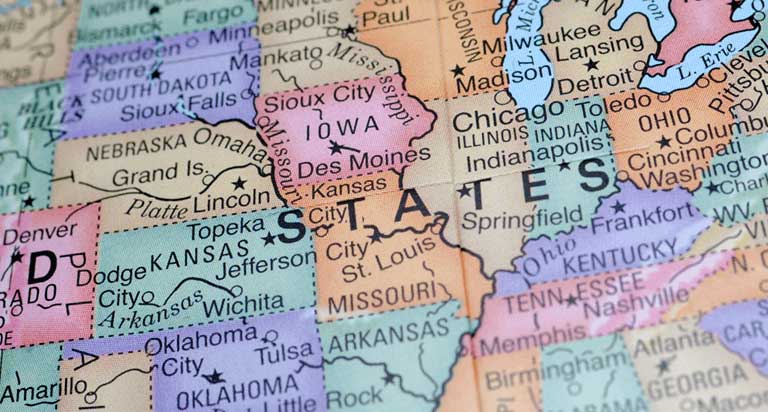What Is the Average Credit Score by State?


Highlights:
- Credit scores are three-digit numbers designed to represent the likelihood of paying your bills on time.
- Credit scores help lenders decide whether to grant you credit.
- The average credit score in the United States is 705, based on VantageScore® data from March 2024.
- It's a myth that you only have one credit score. In fact, you have many credit scores, because there are many different types of credit scores and scoring models.
- It's a good idea to check your credit scores regularly. Checking your credit history and credit scores can help you better understand your current credit position.
Credit scores are three-digit numbers, typically between 300 and 850, that represent your overall credit risk at a glance. Credit scores help lenders decide whether to grant you credit.
Credit scores are calculated based on past financial behavior. This includes your payment history on credit accounts, the credit you use compared to total credit available, and the length of your credit history. It may also include negative financial events, such as: a bankruptcy and past-due accounts that have been turned over to a collection agency.
How do average credit scores compare state by state?
The average credit score in the United States as of March 2024 is 705, based on the VantageScore 3.0 credit score model. Here are the average credit scores by state.
| State/ Territory |
Average VantageScore March 2024 |
State/ Territory |
Average VantageScore March 2024 |
|---|---|---|---|
| Alaska | 709 | Montana | 720 |
| Alabama | 685 | North Carolina | 699 |
| Arkansas | 688 | North Dakota | 720 |
| Arizona | 703 | Nebraska | 720 |
| California | 712 | New Hampshire | 727 |
| Colorado | 720 | New Jersey | 717 |
| Connecticut | 717 | New Mexico | 695 |
| District of Columbia | 704 | Nevada | 691 |
| Delaware | 705 | New York | 713 |
| Florida | 698 | Ohio | 706 |
| Georgia | 686 | Oklahoma | 687 |
| Hawaii | 719 | Oregon | 717 |
| Iowa | 719 | Pennsylvania | 713 |
| Idaho | 718 | Puerto Rico | 695 |
| Illinois | 712 | Rhode Island | 713 |
| Indiana | 704 | South Carolina | 692 |
| Kansas | 712 | South Dakota | 722 |
| Kentucky | 695 | Tennessee | 697 |
| Louisiana | 680 | Texas | 686 |
| Massachusetts | 723 | Utah | 719 |
| Maryland | 706 | Virginia | 712 |
| Maine | 720 | Vermont | 726 |
| Michigan | 710 | Washington | 722 |
| Minnesota | 730 | Wisconsin | 727 |
| Missouri | 705 | West Virginia | 693 |
| Mississippi | 675 | Wyoming | 713 |
Why do I have more than one credit score?
It's a myth that you only have one credit score. You actually have multiple credit scores and they may vary depending on the source.
There are three nationwide credit reporting agencies (NCRAs)—Equifax®, Experian® and TransUnion®. These NCRAs may use similar but not identical formulas to calculate credit scores. In situations where the NCRAs use the same formula, the credit data in each of the NCRAs may be slightly different. Other credit scoring companies use their own formulas. Credit scoring models generally take the same parts of your borrowing history into account when calculating your credit score. Differences in the credit scores happen because of the different scoring models that providers use to evaluate your credit history and calculate credit scores. Where one model might focus on your payment history, another may focus on your total debts. Differences in focus may result in different credit scores. Also, each credit scoring model may use slightly different data and formulas to calculate credit scores.
How the VantageScore is calculated
A VantageScore is calculated with six categories of information contained in your credit reports and ranked in this order:
- Payment history: extremely influential
- Credit utilization: highly influential
- Length of your credit history and your credit mix: highly influential
- Amounts owed: moderately influential
- Recent credit behavior: less influential
- Available credit: less influential
What is a good credit score range?
Credit scores can generally be grouped as follows:
- 800 and above: excellent
- 740 to 799: very good
- 670 to 739: good
- 580 to 669: fair
- 579 and below: poor
Higher credit scores usually mean lower interest rates and more access to credit. Just remember that everyone's financial situation is unique. There's no magic number that will guarantee you better loan rates and terms.
Where can I check my credit scores?
It's a good idea to check your credit scores regularly. You can create a myEquifax™ account at myequifax.com to get free Equifax credit reports. You can also click “Get my free credit score” on your myEquifax dashboard to enroll in Equifax Core Credit™. Equifax Core Credit™ offers you a free monthly Equifax credit report and a free monthly VantageScore 3.0 credit score, based on Equifax data. A VantageScore is one of many types of credit scores. You can also access a free weekly credit report through www.annualcreditreport.com.



